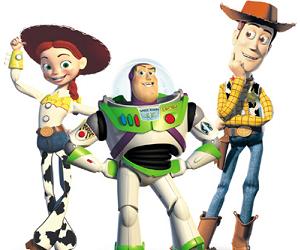8 Twisted Ways to Reinterpret Pop Culture Favorites - Page 2
Thanks to the Internet and Sigmund Freud, it seems we as a species are no longer capable of enjoying a work of art without coming up with ways to make these things truly disturbing. Having scoured the Internet (and in some cases, my own troubled imagination), here are eight examples of favorite bits of modern pop culture that have been twisted into something else altogether. Be warned, though, some of these could permanently alter your perception of something you may cherish, and you should therefore only proceed with a stout heart and a stable psyche.
Mario is a Drugged-Out Serial Killer
 | | Just remember: if some scary drugged-out Italian man comes to your door, say "I'm sorry, but your princess is in another castle." It may just save your life! |
Imagine a very disturbed man who has been using a wide variety of drugs for an extended period of time to cope with an extreme pathological need to kidnap--and presumably murder--women. Eventually, this man has severed his connections with reality and created an intricately detailed existence where the drugs give him power and the women he has to kidnap are actually a damsel in distress he must repeatedly save from the forces of evil. This man is known to you and me as Mario.
He is, indeed, an Italian plumber. He may even have a brother, accomplice, or disciple in the form of Luigi, although I suspect Luigi is mostly a fictional construct. Mario takes all kinds of drugs to escape his reality, each of which makes him feel powerful. They give him the sense that he can fly, grow bigger, breathe fire, and in extreme occasions, be completely invincible for a short period of time. While on these substances, he stalks homes (sometimes driving around on his green bicycle named "Yoshi") in search of the woman he will kidnap, whom he calls "Princess" or "Peach." Perhaps he has access to these homes because of his work as a plumber.
Every once in a while, he finds the damsel--who is always inevitably married or in a relationship--murders the man protecting her, and takes her back to his home where he forces her to bake him a cake before he eviscerates her and imagines that she has been taken from him yet again. The most frightening part of this whole thing is not that Mario has never been caught, but that millions of us have lived vicariously through this twisted man's fantasy world (and galaxy).
There is Another Layer to the Matrix
 | | Because this isn't confusing enough |
Every time a story deals with multiple layers of reality, like in Christopher Nolan's recently released Inception, there is always the problem of knowing when to stop peeling back those layers. Some stories, like eXistenZ, acknowledge this as a very critical problem. Other stories, however, choose not to dwell on it. One such story is the Matrix trilogy, where our protagonists discover that there is a reality behind their reality, but then never question whether there could be yet another reality behind that.
If that were the whole theory, there'd be no need to discuss it. However, the idea that the reality we see in the movies--the one where the machines have taken over and the few people who have awakened are living in Zion--is superceded by yet another reality actually makes sense of certain anomalies in the narrative. Before I get into the details, though, I should address that a large number of people don't seem to fully understand what happened in the movies, and if you are one of these, I recommend The Matrix 101, a website devoted to trying to decipher it all. Still, even it can't really explain certain things without resorting to this theory (which the author of the website rejects, incidentally).
In short, at the end of The Matrix Reloaded and throughout much of The Matrix Revolutions, Neo appears to have supernatural powers when he is outside of the Matrix. If this were all another Matrix-like layer of reality, it would be very easy to explain how Neo tapped into its programming and could alter reality. However, if we are meant to believe that this reality is the ultimate reality, Neo's supernatural powers cannot be explained without resorting to pseudo-scientific nonsense. To be fair, this theory has been around since before The Matrix Revolutions was even released, which if anything gives evidence to its perceived elegance.
Everything after Star Trek: Generations is in Picard's Head
 | | Wow, look at that giant plot hole in the sky! |
About halfway through the seventh Star Trek movie, a star explodes, the Enterprise is destroyed, killing everyone onboard, and Picard is whisked away into a mystical alternate reality called The Nexus. The Nexus apparently grants all of your deepest desires, making reality of your subconscious thoughts. This is where you can live happily ever after without ever fearing death. However, Captain Picard (and Kirk, who may or may not be real) quickly discover that being aware of its unreality takes away any sense of fulfillment they could get from this new life. Therefore, they decide to leave, magically transporting themselves to the moment before the star's explosion and conveniently avoiding any two-Picards-in-one-place paradox. Picard saves the day, prevents the Enterprise destruction, and goes on to have more adventures with his crew.
That conclusion seems almost too good to be true, because it is. Once Picard goes into the Nexus, he never comes out. Everything that happens afterward, including the next four movies, Star Trek: Voyager, and possibly even Star Trek: Enterprise, are all just Picard's imagination. Think about it, just in terms of the movies. In Star Trek: First Contact, Picard deals with the trauma he suffered years earlier at the hands of the Borg. In Star Trek: Insurrection, he deals with getting older and not having a family. In Star Trek: Nemesis, he almost literally faces the evil side of himself. No wonder Soren wanted to get back in the Nexus; it gives you everything you could ever want and allows you to deal with all of your issues!
Moreover, there is no logical way to explain how Picard leaves the Nexus or why he is able to travel through time and space (or why he doesn't encounter himself). Basically, he decided he wanted to get out of the Nexus, so the Nexus gave him the illusion that he did. But did Star Trek: Voyager also occur in Picard's head? Yes. Picard does briefly discuss the events of that show in his conversation with Janeway in Star Trek: Nemesis (and Janeway has been inexplicably promoted to admiral for getting her ship lost while Picard, who has saved the universe dozens of times, remains a captain, which hints at the unreality of it all), and characters who most definitely died in the star explosion do appear occasionally in the show (including Barclay and Riker). By that same logic, it is also possible that the reboot, Star Trek, is also imaginary, as is Star Trek: Enterprise. Granted, some people would be perfectly fine with that.
Toy Story is about Sex
 | | Who do you think she prefers? |
Toy Story is about a young boy's toy, named "Woody," who is limp and lifeless most of the time but magically comes to life when it's left alone. This Woody is then threatened by a 12-inch-tall, battery-operated, space-age toy made of hardened plastic named "Buzz," who promises to go "to infinity and beyond." Buzz is considered dependable and loyal, though a little detached from reality, while Woody is considered old-fashioned and inconstant.
From this lens, Toy Story is about a young boy coming to terms with puberty and feelings of sexual inadequacy. It's hard to tell where the reality ends and the allegory begins, but it's clear that Woody represents Andy (the boy) and Buzz represents everything he can never be. Bo-Peep is a stand-in for the girl Andy loves, regardless of whether there actually is such a girl, and how Woody interacts with her is key to understanding what's going on here. Bo-Peep gets what she needs from Buzz and is temporarily impressed by him, but ultimately comes around to Woody's more rational humanity.
This interpretation can get even more twisted, but I'm not interested in going there. If you're that kind of sick (let's just say mother-son incest), there are plenty of places on the Internet you can go for more information. But really, sometimes a children's movie is just a children's movie.
-e. magill 7/27/2010
|
|